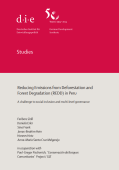The concept of the green economy presented in three reports from leading global organizations is examined in this paper. These include the United Nations Environment Programme's Towards a Green Economy, the World Bank's Inclusive Green Growth and the Organisation for Economic Co-operation and Development's Towards Green Growth. The main critiques of the concept of the green economy are also considered. Contrary to views that the green economy merely represents ‘green-washing’ and tweaking of the current economic system, this paper concludes that the green economy has the potential to effect substantive and transformative change towards the goal of sustainable development.
In this publication, CDKN and Climate Strategies present nine papers from leading climate change academics, policy-advisors and subject matter experts on some of the critical deadlocks hampering climate negotiations, and new economic, social and political ideas to move the debate forward. A number of papers within the publication touch on green growth, including the potential for green growth as a new narrative for climate action, experimental institutional restructuring to better realize “climate compatible development” and the implementation of green bonds to mobilize financial resources from the private sector.

REDD is one of the latest additions to a series of incentive-based mechanisms for reducing carbon emissions. Many developing and emerging countries have started engaging in REDD. Peru, the country with the world’s fourth largest area of tropical forest, is no exception here – with an obvious motivation: about half of Peru’s annual greenhouse gas emissions are currently caused by deforestation.
Over the last years, public and private initiatives have led to a complex multi-level REDD governance architecture in Peru. This architecture faces challenges in terms of social inclusion and coordination. This study identifies and analyses key issues, some of which are merely teething problems, while others are deeply rooted in socio-economic imbalances and political culture, such as insufficient financial, technical and human capacities of ministries and regional governments; legitimacy gaps; and information and participation asymmetries across public actors, NGOs, companies and forest users.
As a global agreement on climate mitigation and absolute emissions reductions remains grid-locked, this paper assesses whether the prospects for international technology cooperation in low-carbon sectors can be improved. It analyses the case of international cooperation on electric vehicle technologies to elaborate on the trade-offs that cooperation such as this inherently attempts to balance– national growth objectives of industrial and technology development versus the global goods benefit of reducing greenhouse gas (GHG) emissions. It focuses on bilateral German-Chinese programmes for electric vehicle development, as well as multilateral platforms on low-carbon technology cooperation related to electric vehicles. Based on insights from these cases studies, this paper ultimately provides policy recommendations to address gaps in international technology cooperation at a bilateral level for ongoing German-Chinese engagement on electric vehicles; and at a multilateral level with a focus on the emerging technology cooperation framework of the United Nations Framework Convention on Climate Change (UNFCCC).
The carbon markets are in the middle of a fundamental crisis - a crisis marked by collapsing prices, fleeing actors, and ever increasing greenhouse gas levels. Yet carbon trading remains at the heart of global attempts to respond to climate change. Not only this, but markets continue to proliferate - particularly in the Global South.
The book helps to make sense of this paradox and brings two urgently needed insights to the analysis of carbon markets. First, the markets must be understood in relation to the politics involved in their development, maintenance and opposition. Second, this politics is multiform and pervasive. Implementation of new techniques and measuring tools, policy development and contestation, and the structuring context of institutional settings and macro-social forces all involve a variety of political actors and create new forms of political agency. The contributions study the total extent of the carbon markets, from their prehistory to their contemporary expansion and wider impacts.
